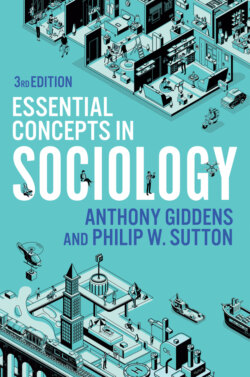Читать книгу Essential Concepts in Sociology - Anthony Giddens - Страница 32
Meaning and Interpretation
ОглавлениеPostmodern thinking is diverse, and theorists prioritize different elements associated with the suggested shift to a postmodern society. One target of most postmodernists is the attempt by social theorists, from Comte and Marx to Giddens, to discern the direction and shape of history. For these theorists, the process of historical change is structured and ‘goes somewhere’ – it makes progress. In Marxist theory, for example, this progressive movement is from capitalism to the more egalitarian societies of socialism and communism. However, postmodern thinkers reject such grand theorizing.
The trust people invested previously in science, politicians and human progress in history has been eroded as fears of nuclear war or environmental catastrophe, along with continuing conflicts and episodes of genocide, puncture the civilized veneer of modern societies. Lyotard described this process as the collapse of ‘metanarratives’, those big stories of continuous progress that justified deference towards scientists, experts and professionals. Instead, the character of postmodernity is irrevocably diverse and fragmented, exemplified by the worldwide web, which teems with images, videos and other material from almost every culture around the world. The experience of web surfing can be one of randomness as we encounter a wide range of values and ideas very different from our own. This potentially disorientating experience is typical of a postmodern culture that is saturated with mass-media content.
Jean Baudrillard argues that the electronic media have destroyed our relationship to the past, creating a chaotic, empty world in which society is influenced, above all, by signs and images. For Baudrillard, the rising prominence of the mass media erodes the border between reality and its representation, leaving just one ‘hyperreality’ within which we all live. In a hyperreal world, our perception of events and our understanding of the social world become highly dependent on their being viewed through mass media such as television. Baudrillard’s (1995) provocative newspaper articles ‘The Gulf War Will Not Take Place’, ‘The Gulf War is Not Really Taking Place’ and ‘The Gulf War Did Not Take Place’, published before, during and after the war in 1991, aimed to show how apparently primary ‘real-world’ events, such as armies fighting in Kuwait, and the apparently secondary media reports of them were actually part of the same hyperreality.
A good way of thinking about postmodern ideas as received in sociology is to distinguish between the main tenets of postmodern social change and sociological theory’s ability to account for and understand this. The rapid growth and spread of mass media, new information technologies, more fluid movements of people across national boundaries, the demise of social class identities, and the emergence of multicultural societies – all of these changes, say postmodernists, lead us to conclude that we no longer live in a modern world ordered by national states. Modernity is dead and we are entering a postmodern period. The question then arises as to whether ‘modern’ sociology can adequately analyse a ‘post-modern’ world: Is there a sociology of postmodernity? Or are the consequences of postmodern change so radical that they render modern theories and concepts redundant? Do we need a postmodern sociology for a postmodern world?
